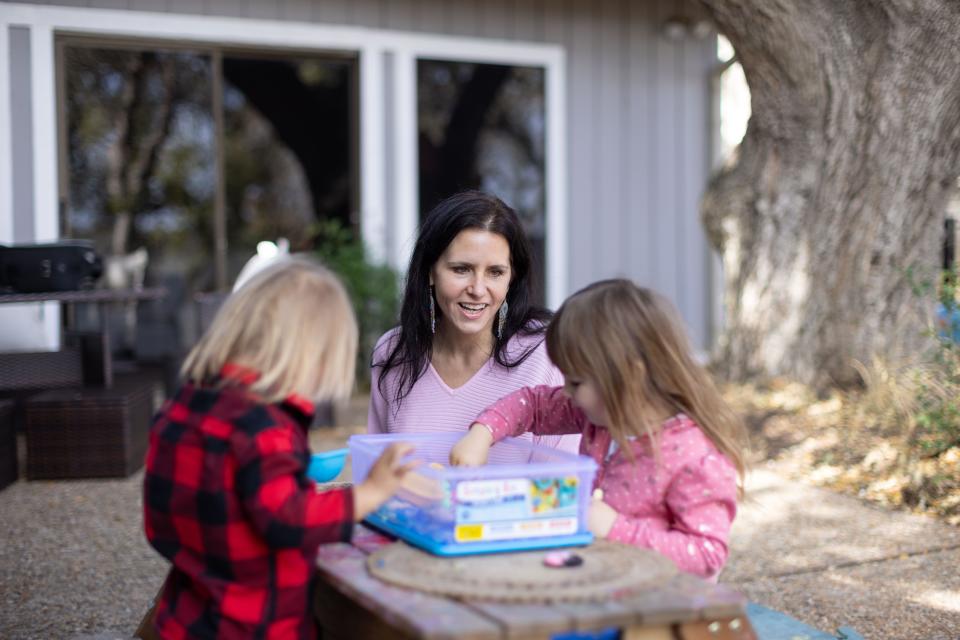Lakeway dress makers, artists, lawyers and cake makers were all part of the conversation about what businesses residents should be able to run out of their homes under city code.
The City Council discussed revising the city’s ordinance in light of a lawsuit filed this year by a local day care provider who is arguing that the city’s code is unduly strict and would prevent her from providing a valuable service to the community in her home.
Bianca King filed the suit this spring after she was denied a permit to continue operating a small day care business out of her home. King is a single mother with experience working in education who provides child care for several local families. She opened her day care after she was laid off earlier in the pandemic and it is now her main source of income.
King registered her business as a babysitting service with the Texas Health and Human Services Commission in January 2021 to watch up to three preschool kids in her home in addition to her own two children. In the fall, she passed a voluntary state inspection that allowed her to watch up to four children in addition to her own.

Residents filed complaints about the day care operation, and have spoken in opposition to the business at past city government meetings. Former Lakeway Mayor Joe Bain cited the disruption the day care caused to neighbors and golfers at the Hills of Lakeway golf course, which borders Kings property on one side.
The City Council discussed possible edits to the code to broaden permitted at home businesses, though it ultimately decided to table a vote on the issue until the next meeting in June. Current code says any at-home occupation must be secondary to the use of the house as a living space.
There are also 19 provisions at-home businesses must follow, including that they can’t provide services or sell merchandise to customers on the premises and can’t store merchandise on the property. The occupation must be essentially undetectable by the public and can’t have customers driving to the home.
More: Lakeway resident sues city to keep her at-home day care business open
Director of Building and Development Services Erin Carr said thay under the strictest interpretation, the existing criteria potentially exclude most home occupation options, including those listed as acceptable under the code. Many of these criteria are hard to enforce and have the potential to limit many activities beyond those intended, including receiving deliveries and the storage of materials inside the home.
The changes the council discussed were recommended by the Zoning and Planning Commission with the help of city staff and the city attorney. Debated changes included increasing the situations in which the city might call for a traffic impact analysis and striking the rule requiring an at-home business to only take up 20% of the gross floor area in a unit.
The council also discussed changes to the issue of employees reporting to the site and how many car trips might be made by customers or those seeking service. Current code says there can be no employees reporting to at-home businesses, and no occupation can have customers driving or commuting to the home.
The amendments suggested allowing an employee in certain cases and limited hours a week, and allowing three customer car trips a day. Members of the council said they did not like how restrictive this change was, and asked staff to revise the language.
Gretchen Vance, who was appointed to Mayor pro tem at the start of the meeting, said in her mind it comes down to property rights.
“I do believe in property rights and I know we live in a property rights state. … I worry about, and this is something I haven’t researched for a while, but where do property rights begin, and then when do you infringe on your neighbor?” she said. “The issue becomes what is tolerable for one neighbor may be intolerable for another. And so therefore, when we do ordinances, we try to assess what is reasonable to someone and that’s really what we’re seeking.”
More: Szimanski, Mastrangelo, Brynteson win seats on Lakeway City Council
Council Member Louis Mastrangelo said he felt the complaints about toys and noise from children in a residential area were embarrassing to the city.
“Ultimately, what (the rule) should be, is it should simply be I am not obviously aware that there’s a business next door,” he said. “If the Brady Bunch moved in next door to me, they’d be in just as much violation as somebody watching three or four kids.”
King spoke to the council about her business and asked to have the code amended in such a way that it could stay open, since it is already regulated by the state.
“We are excited to work together with the council and the mayor to revise the ordinance so we can welcome and support home businesses, including family childcare, and so this ordinance can rise to meet the needs of Lakeway families and support the city’s changing demographics,” she said. “We ask that you support the permit conditions the state of Texas mandates for family childcare, and allow them to continue to regulate childcare.”
King’s lawyers, from the Institute of Justice in Washington, also made the legal case for why the city should loosen its restrictions, citing parts of the Texas Constitution they feel contradict Lakeway’s ordinance.
The City Council will discuss this issue again at its meeting on June 20.
This article originally appeared on Austin American-Statesman: Lakeway City Council discusses at-home business ordinance after lawsuit























